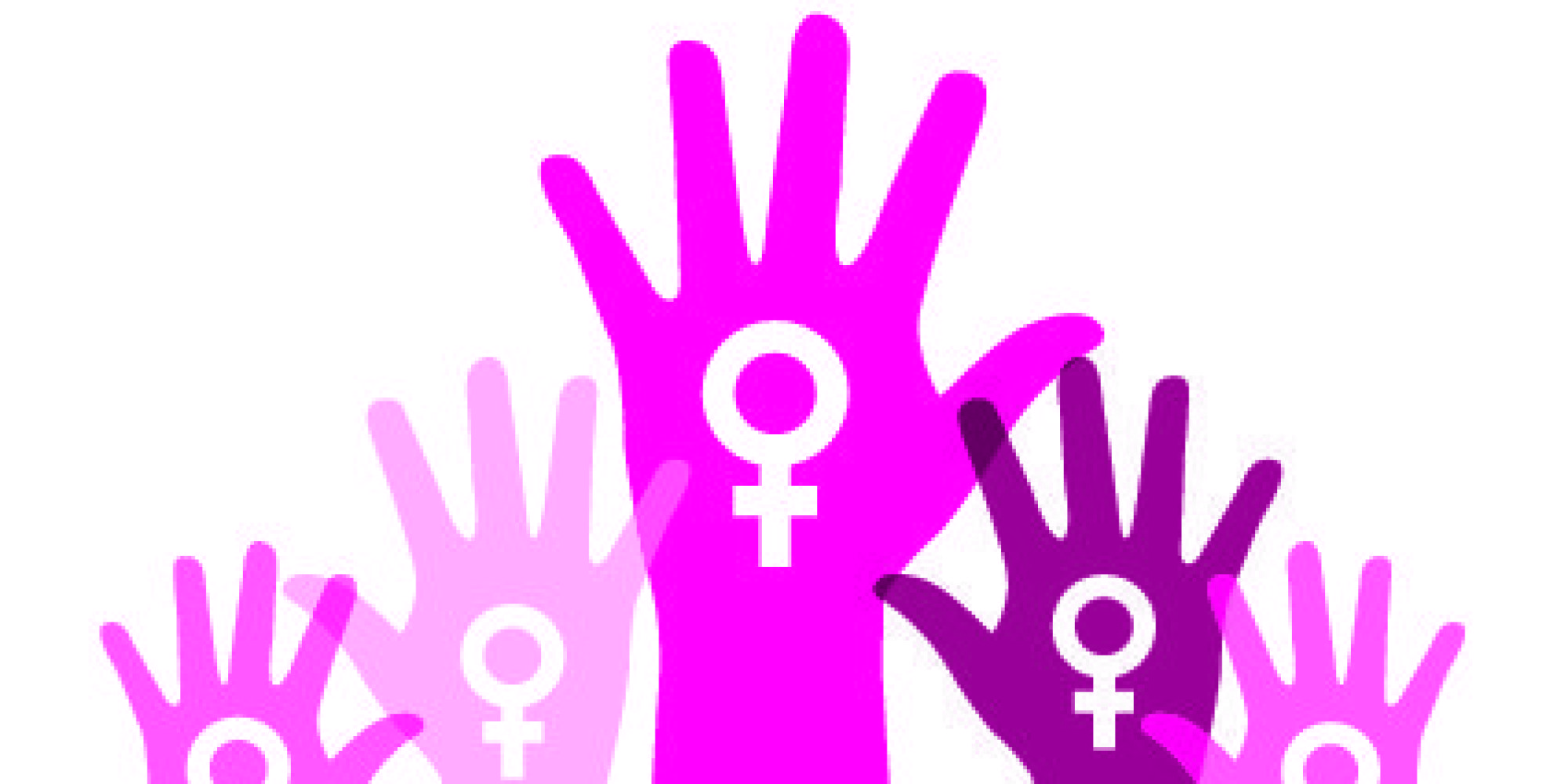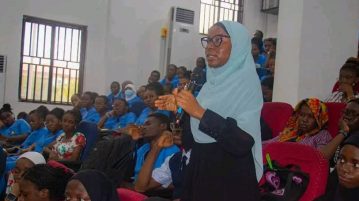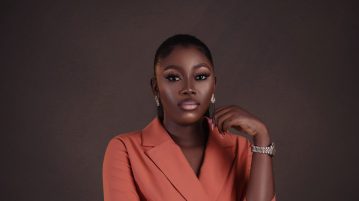In Lagos State, Nigeria – like some other part of the world – September is the Domestic and Sexual Violence Awareness Month. In commemoration of this month, the medical women team against GBV have set up help lines to care for female doctors and the general populace. Likewise, one of our female doctors who is a survivor shared her experience and advice on way out.
Q: What does Gender-based and domestic violence mean to you?
To me; I’d say domestic violence refers to any form of abuse (including emotional, physical, sexual) that takes place in a cohabitation. Also, Gender based violence would be any type of violence targeted against a person because of their gender.
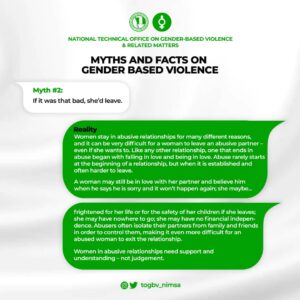
Q: Thinking back on your experience, how did you meet your partner then – the abuser?
I have had my experience of any type of domestic violence you can ever think of, yes, any! Over a period of almost 29 years now. However, my most recent experience would have to be when I was in my first year medical school about 10 years ago. If I remember, I was 19 years, you know at that age you receive a lot of attention from the opposite gender and being a fresher, as they’ll say, I was in the spotlight! I followed a group of friends to a club, while we were enjoying our time there, a group of guys joined us and there he was. A 3rd year aerospace engineering student, aged 21. He was the nicest and coolest person ever, although we didn’t exchange contact at that point, I and my friends left, and I think 2 days later I received his friend request on Facebook. We got chatting, he was so helpful to me, always there whenever I needed him and even when I didn’t, he was there.
Q: Wow! So, how or when did the whole violence start? Where there any subtle or visible premonition signs earlier or did he just suddenly change in the relationship? Was he influenced by friends, environment or anything? Or do you think you were the trigger to the whole violence situation?
We began dating a few months later, which was after I ended my previous relationship (caused by my supposed close relationship with this guy). To be honest, at that time I didn’t see any signs of violence but looking back now the signs were there. I’m not sure “obsession” is the right word to use but he was obsessed and controlling. Before the abuse started, he always told me who to be friends with and who I should stay away from. Infact, I didn’t know he had access to my social media accounts, this was way before we even started dating. He knew who I was chatting with and what I was chatting about, but as a naive girl I thought he was looking out for me.
The abuse started when we decided to move in together which was a very big mistake! He became even more controlling. It was subtle at first, raising voices which led to a slap or two and so on. Especially when I resisted his commands and no, he wasn’t influenced by friends. I also don’t think I triggered anything. For context’s sake, we were both Nigerians schooling in Europe but in separate schools.
Q: In all of these happenings, how did you cope? Did it affect you physically, mentally, academically, financially, career wise or in any way? Where you able to share your predicaments? If yes, with whom and was there any form of help?
Well, I wasn’t just suffering physical abuse, I also endured emotional abuse. I was so dependent on him, it almost felt like I couldn’t survive without him – even to the point of making decisions for me. Pertaining to both form of abuse he subjected me to, he always came back to apologize and made efforts to make it up to me, but it still continued.
My self-esteem was mostly affected, I didn’t know how to relate properly because I thought everyone was better than me, these were words that came to my ears from my abuser’s mouth virtually every day. At a particular stage in the relationship, he was in control of my finances (money sent to me by my parents for my upkeep).
I wasn’t able to communicate these occurrences with any family or friends for the longest time, because he threatened to leave me. It wasn’t until a male friend of mine kept asking if I was fine, after seeing different scars on my face at different times. Eventually, I narrated my grievances to him, and he advised that I reported him to the police, which I wasn’t going to do because he would leave me and that was a terrifying thought. So, I told him I was going to be fine. However, this encounter gave me the courage to tell my other friend and, their consolations were soothing.
The last straw that broke the camel’s back was when he (my abusive partner) walked in on me telling another friend of mine about my ordeal via Skype. He got so angry, that he beat me up while still on the call. He also packed my things and told me to move out of the apartment the next day after school (mind you, I paid 2/3rd of the house rent). I believed it was over at the point, became scared thinking, what was I going to do? So, I proceeded to inform my closest friend who was like a sister to me, she was so pissed that she followed me to the house to pick up my things. On getting there, he had already unpacked them and he was in an apologetic mood as usual, but my friend wasn’t having it. She confronted him and told me to move in with her which I did. While at her place I started coming to the realization that, I could survive without him.
Q: Being in such an abusive relationship, how long did it last for and why did you stay for that amount of time despite the continuous abuse?
We were together for 2 years and I stayed because I was scared of being alone. This person made me feel I was nothing without him. He used my weaknesses to control me.
Q: Wow, but when you eventually left the relationship and got separated from your partner, was there any aftermath effect on you or for him? Or any action taken to make him realize his faults or make him pay for his wrong doings?
After the relationship ended, it did affect me positively and negatively. Positively in the sense that, I began to work on being independent, I still am. And for the negative part, I began to think I didn’t need anybody! Well I’m still working on allowing people help me though. Also, I wanted to make him to pay so bad, I made some very not-so-good decisions – things against by morals and beliefs.
Q: How did you heal as a young woman and as a medical practitioner?
I’m still healing, and God is helping me heal…
Q: Any words of advice or encouragement for females (young and old) going through such abuse or violence in their relationships?
Well, I don’t think I’m in the right position to give advice to the victims because to be honest, it’s not as people think it is. A lot of people would be like; “why not leave”, “what are you doing there” and so on… but where do you want them to leave to? You don’t know the extent of power the abusers have on them. However, my advice would only go to the people around them; to continue showing them love and try to understand the type of abuse they’re enduring.
Most times people find it difficult to leave emotionally abusive partners. You just need to prove to them that they can do well or survive without the abusers.
Even after my friend took me out, I still went back, but this time I realized I could leave! And that’s what I did. Another thing is, living with your boyfriend or someone you’re not married to is a bad idea. It’s not that some married people don’t go through the same ordeal, but I can’t give any comment about that because I’m not married. What I can only say for sure is; don’t live with your boyfriend.
Q: Any final notes?
Yes. There’s a difference between love and obsession! And If you’re looking for the real definition of Love, look at 1 Corinthians 13:4-8.
4 Love is patient, love is kind. It does not envy, it does not boast, it is not proud. 5 It does not dishonor others, it is not self-seeking, it is not easily angered, it keeps no record of wrongs. 6 Love does not delight in evil but rejoices with the truth. 7 It always protects, always trusts, always hopes, always perseveres. 8 Love never fails… ~ 1 Corinthians 13:4-8 NIV
To get help, follow this link and here is An Advisory on Sexual and Gender-Based Violence in Lagos State.
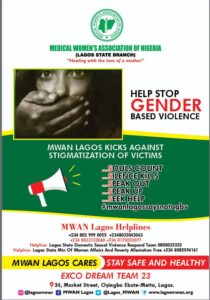
Photo credit: Ogooluwa Olufemi-Ajiboso, National Technical Officer on Gender-Based Violence and Related Matters, NiMSA and Medical Women’s Association of Nigeria, Lagos State Branch.

